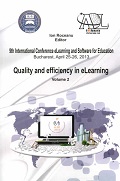AUTOMATED GENERATION OF QUESTION BANK TO ASSIST IN THE EVALUATION OF THE POSSESSED KNOWLEDGE REPRESENTED BY EXTEMPORE PARAGRAPH IN A TECHNICAL CONTEXT
AUTOMATED GENERATION OF QUESTION BANK TO ASSIST IN THE EVALUATION OF THE POSSESSED KNOWLEDGE REPRESENTED BY EXTEMPORE PARAGRAPH IN A TECHNICAL CONTEXT
Author(s): Mallya Akshay, Raj S. Kiran, Nitin V. Pujari, Jose Amalna, S. R. Gowthami, Spoorthy P. SaiSubject(s): Education
Published by: Carol I National Defence University Publishing House
Keywords: effective learning; complexity assessment; question answering systems; Language processing; knowledge complexity assessment; recursive probing
Summary/Abstract: Knowledge acquisition involves complex cognitive processes and the evaluation of this knowledge plays a vital role in judging the cognitive ability of an individual. Not only does evaluation give the measure of the extent of knowledge, it also helps one to analyse the scope of improvement for an overall effective learning .Traditionally, the evaluation of one’s knowledge is determined by probing the knowledge acquired in the form of questions. This paper attempts to automate the process of generating relevant question bank pertaining to the paragraph's technical context to assist in evaluation. The knowledge on a particular topic can be captured by a paragraph in the context of that domain. The current acumen of the individual in the subject pertaining to that paragraph can be determined by the technical keywords used, and their consolidation into a paragraph along with connectors. The empirical evaluation of knowledge in the domain can be implemented by posing questions from the generated question bank using the technical keywords present in the paragraph with the help of a global knowledge base as the basis. The extent of the knowledge in the domain can be determined recursively by posing questions from the generated question bank which diverge from the subject of the paragraph, adhering to the domain. The above process of context-based repeated probing can be used to evaluate the breadth and depth of the knowledge of an individual in a technical context. This paper also attempts to remove the semantic redundancy of the questions generated in the question bank to achieve distinct consistency.
Journal: Conference proceedings of »eLearning and Software for Education« (eLSE)
- Issue Year: 9/2013
- Issue No: 02
- Page Range: 627-632
- Page Count: 6
- Language: English

